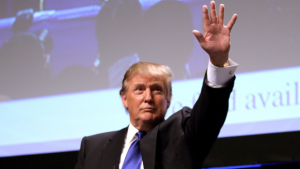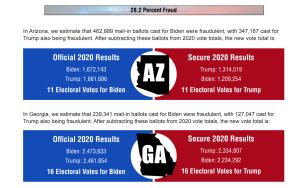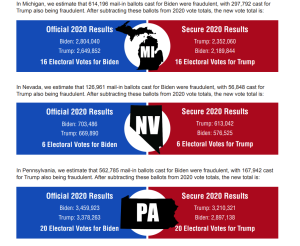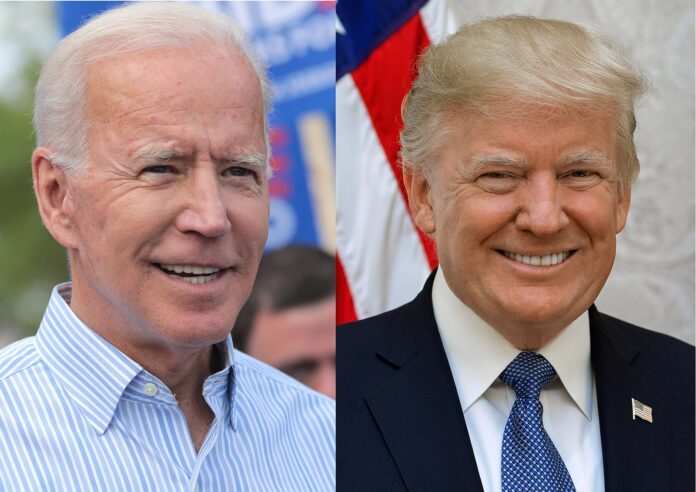Life, Liberty, Property #49: Biden skates while Trump waits for his trial in documents case, as the deep state attempts to convict him.
IN THIS ISSUE:
- Biden Skates While Trump Waits
- Trump Won, Study Says
- Cartoon
SUBSCRIBE to Life, Liberty & Property (it’s free). Read previous issues.
 Biden Skates While Trump Waits
Biden Skates While Trump Waits
With Special Consul Robert Hur declaring on Thursday that President Joe Biden will not face charges for unlawfully possessing classified documents, the matter now moves fully into the political realm, where it has mainly resided from the beginning. As such, Hur’s report has a major role to play in forthcoming public policy issues and the public’s trust in government (insofar as any remains at this point).
The great point of contention, of course, is whether the government has treated Biden and former president Donald Trump evenhandedly in regard to their respective documents cases. That has been almost exclusively a political debate from the beginning, though participants have generally hastened to characterize their own judgments as having been entirely above such tawdry concerns.
If Trump is being dealt with more harshly than Biden, it may cast serious doubt on the integrity of the federal government. We should all want to avoid a further decline in the people’s opinion of the government, which is already at the lowest ever recorded.
If the differences between the government’s treatment of the two cases are based solely on differences between the two situations, the public may be persuaded to accept that. If there is much room for doubt, however, it will only further undermine trust in government.
As soon as the Biden team turned over his documents to the National Archives and Records Administration (NARA) in late 2022, the comparisons began in earnest.
Biden supporters characterized the retention of documents as an honest mistake. Trump partisans argued that Biden was a hypocrite for hammering the ex-president for doing the same thing Biden had done, and they characterized the pursuit and prosecution of Trump as “deep state” revenge for Trump’s supposed efforts to clean up the Augean stables of the federal government and an attempt to eliminate Trump as a viable opponent for Biden in the 2024 elections.
Both sides had a good deal of evidence for their respective cases.
Cooperation with Federal Agencies:
The differences between the ways the two parties handled the documents are striking. Biden’s team immediately turned over the government documents to NARA the day after they were found. They have not been shown to have obstructed any investigation and in fact initiated the turnover of documents. Of course, the Biden team had the example of Trump’s turmoil as a strong incentive to get out ahead of the situation. Still, they did so, to their credit.
Those documents, however, were not the only items in question, as Hur made clear in his report. Biden did in fact break the law, and his organization’s cooperation with the investigation does not change that.
Trump’s team engaged in much pushback against NARA—which Trump and his people characterized (plausibly, to be fair) as negotiation. Trump and his associates seem to have knowingly kept documents which NARA had requested, while claiming they had given them everything. That is the legal foundation for the obstruction-of-justice charges, which are of course highly serious.
It was exceedingly unusual for the federal government, however, to push a records dispute into the criminal realm, as Trump notes. Before Trump, negotiations between the National Archive and former officeholders had generally been cooperative and cordial. Whom you blame for the dispute between Trump and NARA, and the ultimate intercession by the Justice Department, may depend in great part on your attitude toward Trump and the federal government, respectively. (It is worth noting that the latter has approval ratings far lower than even Trump’s anemic numbers. Biden trails Trump in that regard, too.)
Trump has been notoriously antagonistic toward federal law enforcement agencies and vice versa since before the 2016 election. Biden, by contrast, has no fear of them—for good reason, as the special counsel’s decision not to prosecute indicates. The obstruction of justice charge against Trump highlights the fact that the Department of Justice pursued him in a manner far different from its dealings with other former officeholders, most notably regarding Hillary Clinton’s use of a private email server to store thousands of government documents while she served as Secretary of State under President Barack Obama.
With these matters having been handled in the past without aggressiveness and eventual prosecution, Trump had good reason to believe that the discussion with the National Archive was not serious and was unlikely to bring on criminal charges. In thinking that, Trump was seriously mistaken. This suggests that he failed to live by his own statements about the potential treachery of the deep state.
Trump’s trust of the government looks quite foolish in retrospect. It also suggests, however, that federal government officials deliberately sandbagged a former president and trapped him into an obstruction of justice charge. Trump appears to have been snookered into a criminal charge in much the same way that those caught up in the 2020 plot to kidnap Gov. Gretchen Whitmer of Michigan were lured into a scheme invented by the FBI.
That Trump was singled out for special treatment in these document cases is obvious. It seems clear that Trump was held to a significantly higher standard of integrity and attention to detail than previous officeholders were. Whether that was justified for reasons unique to Trump is up for debate.
Importance of the Documents:
Another large difference between the Trump and Biden cases is the claimed importance of the documents. Trump is charged with having kept documents marked as “Top Secret” and having shown them to people lacking proper security clearances, thus violating the Espionage Act. That is a serious crime, and it could have created important national security vulnerabilities.
“Could have,” not “did.” Documents marked Top Secret may or may not be important to the nation’s security. Trump and liberty-oriented policymakers and analysts have long maintained that a good deal of what the nation’s intelligence agencies characterize as secret is not any threat to the nation’s security, and that the designation is regularly deployed to save those agencies and their personnel from embarrassment and possibly criminal prosecution.
In addition, Trump maintains that he declassified the documents—possibly, in some cases, by merely “thinking about it.” That is a strong rebuttal to all the charges, though it is obviously subject to a significant amount of legal argumentation, citation of precedents, and whatnot. It is important to note, however, that it will be up to the prosecution to prove that Trump did not declassify the documents, and to show that beyond a reasonable doubt. That would be a difficult thing to do before a fair-minded jury. (We may debate later whether the latter are a common occurrence in the present environment.)
In the Hillary Clinton case, it is almost a certainty that she illegally possessed countless documents of possibly highly sensitive nature. We will probably never know, however, because she and her team destroyed the evidence before the FBI got around to pursuing the matter with any show of earnest.
The documents found to be in Biden’s possession were not classified as sensitive. That is a big difference from Trump’s situation.
There is an important qualifier in that statement, however: the words “found to be in Biden’s possession.”
The FBI raid of Trump’s residence is a major difference between the two cases. In Trump’s case, we know how many documents he had. The FBI took them. In Biden’s case, we do not know how many documents he had and may still have. The FBI did not raid Biden’s residences and other places where documents might be found, instead accepting his lawyers’ word on it.
The documents Biden’ team turned over were not classified as sensitive. Those, however, are only the ones we know about. Perhaps Biden’s team turned over every relevant document; perhaps not. There is no way to prove either contention at this point.
As noted earlier, Hillary Clinton reportedly destroyed thousands of emails the possession of which may have violated the Espionage Act and other laws. She was able to do so because she had plenty of advance notice that the emails could pose a problem for her. It is not outside the realm of possibility that Biden and his people destroyed documents—perhaps all the damaging ones—before turning over the harmless trove. We cannot know.
With that in mind, the great difference in the volume and nature of the documents Trump had and those Biden had may rely entirely on the extremely different ways in which they were obtained.
Implications for Politics and Policy:
The most telling differences between the Trump and Biden cases are in how the FBI, Justice Department, other agencies, and the national media have pursued them. It is entirely possible that Trump recklessly or deliberately engaged in flouting of the law, which placed the national security in great jeopardy. However, that seems unlikely in light of the great scrutiny placed on the matter from the beginning. Hence, it is fair to say that Trump is being charged with violating the letter of the law, not with endangering the nation.
Hillary Clinton was given a free pass after then-FBI director James Comey’s decision to reopen the investigation into her email server two weeks before the 2016 election put him under fire for disrupting her presumed smooth sail into the White House as 45th president. Hur is giving Biden a similar mulligan in his documents case. Trump is the outlier here, and it lends credence to his assertions about the deep state, government corruption, the decline of rule of law, and his opponents’ weaponizing of the justice system. These are devastating charges, and tens of millions of voters appear to think they have some merit.
The decision not to pursue a case against Biden is a double-edged sword, however. Biden escapes prosecution and the possible destruction of his chances in the November election, but the characterization of him in the special counsel’s report is a catastrophic blow to his candidacy.
Hur states that he decided not to bring criminal charges because he was unlikely to be able to obtain a conviction because the president is in such a pathetic condition: “Mr. Biden would likely present himself to a jury, as he did during our interview of him, as a sympathetic, well-meaning, elderly man with a poor memory.” Hur notes that Biden could not remember when he began and ended his terms as vice president and he “did not remember, even within several years, when his son Beau died.”
Biden took great offense at the latter observation, in a contentious and rather frightening press conference larded with additional memory lapses on Thursday. “It wasn’t any of their damn business,” Biden told the reporters, referring to the special counsel’s investigators. Biden’s call for privacy is in great contrast, of course, to his frequent public references to his son’s death in an ongoing bid to gather sympathy and present himself as a patriot who has given something precious for his country. (Those are laudable sentiments on anyone’s part, but using them in political campaigns is unsavory.)
Hur explicitly concludes that Biden broke the law and endangered the national security in working on a book in 2016 with ghostwriter Mark Zwonitzer: “The practices of retaining classified material in unsecured locations and reading classified material to one’s ghostwriter present serious risks to national security, given the vulnerability of extraordinarily sensitive information to loss or compromise to America’s adversaries.”
Biden also broke the law in retaining and disclosing information in documents about foreign policy and Afghanistan, Hur states:
Our investigation uncovered evidence that President Biden willfully retained and disclosed classified materials after his vice presidency when he was a private citizen. These materials included (1) marked classified documents about military and foreign policy in Afghanistan, and (2) notebooks containing Mr. Biden’s handwritten entries about issues of national security and foreign policy implicating sensitive intelligence sources and methods. FBI agents recovered these materials from the garage, offices, and basement den in Mr. Biden’s Wilmington, Delaware home.
The special counsel’s reasoning for not pursuing prosecution makes Biden look irresponsible and stupid:
Given the intelligence and military officials present and the topics discussed at the meetings Mr. Biden recounted for Zwonitzer, Mr. Biden should have realized that his notes did or were likely to contain classified information. But taken as a whole, the evidence will likely leave jurors with reasonable doubts about whether Mr. Biden knew he was sharing classified information with Zwonitzer and intended to do so. For these jurors, Mr. Biden’s apparent lapses and failures in February and April 2017 will likely appear consistent with the diminished faculties and faulty memory he showed in Zwonitzer’s interview recordings and in our interview of him. Therefore, we conclude that the evidence does not establish that Mr. Biden willfully disclosed national defense information to Zwonitzer.
Hur repeatedly observes that he decided against prosecution not because Biden was innocent of any wrongdoing but because (1) it would be difficult to get a jury to convict a broken-down old duffer such as he, and (2) Biden is unlikely to reoffend.
Of course, the deterrent effect of prosecution of crimes is also meant to send a warning to others not to commit those offenses. In Biden’s case, the special counsel evidently decided that it was not worth the bother—and also presumably on the basis that such a prosecution would backfire because Biden would not be convicted.
That is the very opposite of the way the government has handled Trump’s document controversy. To me, that is the real difference between the two cases. Trump is being accused most heavily of being uncooperative with government agencies that went after him with daggers drawn, whereas Biden is shown to have recklessly and deliberately flouted the law until his staff initiated cooperation with a highly sympathetic federal government.
“Biden was warned many times about classified documents,” as a subhead in a Wall Street Journal article on the Hur report described Biden’s staff’s concerns during his years as vice president. The federal government invaded Trump’s home without warning. The contrast is stark.
The blatantly differing treatment of the two cases calls into question the current state of the rule of law and due process and further undermines the public’s trust in government.
Effect on the 2024 Election:
Biden and his supporters clearly see Hur’s report as a blockbuster cast directly into their election campaign. Arriving as it does in the wake of several disturbing lapses of memory on Biden’s part in the past week, the report confirms widespread worries about the president’s fitness for office. The Wall Street Journal reports:
Paul Begala, a Democratic strategist and former adviser to President Bill Clinton, said that with the report, Biden is “being cleared legally and he’s being kneecapped politically.” He said Biden’s age is “his biggest liability. Every politician has competing master narratives—the positive and the negative.”
“Anything that feeds the negative master narrative is especially damaging,” he said. …
“The most damaging thing that can happen to a politician is to have an existing negative suspicion confirmed. This is why this is challenging,” said James Carville, a veteran Democratic strategist and former adviser to President Clinton. “When people see this, they will say, ‘Look, Martha, I told you so.’”
The likelihood that Martha will get a chance to vote for Biden this fall may be receding rapidly. If so, Hur’s report may be the greatest gift that anyone could give the Democrat Party this year. Hur declares Biden as not prosecutable—and thus above the law—and mentally incompetent. The Democrats are still in a bind as to how to get rid of Biden and keep him off the November ballot, but that looks much less difficult than getting him past the post again.
Sources: Reuters; AP; Report on the Investigation Into Unauthorized Removal, Retention, and Disclosure of Classified Documents Discovered at Locations Including the Penn Biden Center and the Delaware Private Residence of President Joseph R. Biden, Jr.; The Wall Street Journal
 Trump Won, Study Says
Trump Won, Study Says
Did Joe Biden get illegal help in winning the 2020 election over Donald Trump? A new study by my colleagues at The Heartland Institute says he did, and that those who gave him that help admit to it.
The report is based on the results of a Heartland Institute/Rasmussen poll that found voters acknowledged committing rampant fraud in the 2020 elections. The current study summarizes those finding as follows:
28.2 percent of respondents who voted by mail admitted to committing at least one kind of voter fraud. This means that more than one-in-four ballots cast by mail in 2020 were likely cast fraudulently, and thus should not have been counted.
The analysis notes that the election was distorted by a torrent of “fraudulent mail-in ballots” resulting from “abrupt and hasty changes to voting procedures in the months before the 2020 election [which] occurred despite the fact that ample evidence showed that mass mail-in voting, unsecure ballot drop boxes, ballot harvesting, and lack of signature verification would result in a flood of fraudulent ballots that would undermine the accuracy of the election results.”
These “questionable policies were typically implemented through regulatory fiat by state officials, such as secretaries of state, despite the fact that the U.S. Constitution explicitly declares that state legislatures are the only state institutions that can make or change election laws,” the study notes.
The Heartland study dives deeper into the polling data to conduct a rough analysis of how those invalid, illegal votes would have affected the outcome of the election:
Because Joe Biden received significantly more mail-in votes than Donald Trump, we conclude that the 2020 election outcome would have been different in the key swing states that Donald Trump lost by razor thin margins in 2020—Arizona, Georgia, Michigan, Nevada, Pennsylvania, and Wisconsin— under the 28.2 percent [fraud] scenario. We also analyzed the electoral results for those six swing states under every integer from 27 percent fraud down to 1 percent fraud, allowing readers to see the impact that fraudulent mail-in ballots might have produced under each scenario.
Their conclusion:
[I]f the voter fraud captured by our 2023 Heartland Institute/Rasmussen survey was indicative of what occurred in the 2020 presidential election, there is a high likelihood that had mail-in ballot fraud been severely limited, Donald Trump would have won the election. In fact, as our study shows, of the 29 different scenarios presented in this paper, Trump wins in all but three (when mail-in ballot fraud is limited to 1–3 percent of the ballots counted). That means that even if the level of fraud shown by our survey (28.2 percent of all mail-in ballots) substantially overstates the true level of fraud that occurred, Trump would still have won in most of the likely scenarios, with only three exceptions, as noted above. We have no reason to believe that our survey overstated voter fraud by more than 25 percentage points, and thus, we must conclude that the best available evidence suggests that mail-in ballot fraud significantly impacted the 2020 presidential election, in favor of Joe Biden.
The paper is clear in its methodology and reasoning, and its conclusions are quite compelling:




The authors of the study delve into a variety of scenarios with different fraud rate calculations and varying assumptions “to maximize transparency.” Nearly all show Trump winning the election, with the few Biden-victory assumptions proving highly unlikely.
This study is highly important and should guide states’ voting procedures if the public wants to increase the reliability and credibility of our elections. Read it here.
Sources: The Heartland Institute; The Heartland Institute
Cartoon












